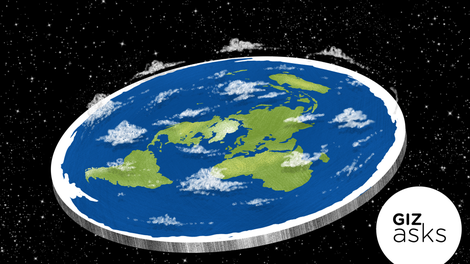
I saw a video recently by a flat Earther. (Never mind for now how it came about that I was watching such a thing -- largely by accident.)
What was odd was the bit where the flat Earther earnestly tells us that he doesn't want to be a flat Earther. It is, after all, a pain in the ass being an 'out' flat earther. It involves expounding on a conspiracy involving NASA and the analogous agencies of several other governments, lots of other people and institutions, etc., and it involves trying to dislodge everybody else's prejudice in favor of stuff that they have been taught since first grade. He doesn't want to be entangled in all this, our video host assures us. Because he'd much rather be about his day job.
What's the day job? Warning people about chemtrails.
I kid you not.
Personally, I know how he feels. I'd much rather not blog about the faeries who threaten vengeance upon us as a species for the cancellation of Sabrina the Teen-Aged Witch. I'd love to lay the matter to rest and go back to disbelieving in faeries like most people and work on my day job -- leprechaun wrangling.
Christopher,
ReplyDeleteI googled "chemtrails," and Wikipedia states, "The chemtrail conspiracy theory is the false claim ... ." (They pay people to spread that claim?) Thus, his day job is in keeping with his being a flat Earther, so I don't understand why you write, "I kid you not." Well, I guess I do; you are observing that he is doubly a nutcase.
Also, he is probably lying (perhaps to himself) that he doesn't want to be a flat Earther. He thinks that claiming that he doesn't want to be a flat Earther will make his claims that the Earth is flat more credible. And it's not a pain in the ass to him; he enjoys it or he wouldn't do it. Or perhaps he enjoys having a pain in his ass (and being one to others).
Henry,
ReplyDeleteYou are right about the phrase "I kid you not." One would normally expect a flat earther making the point "I don't WANT to be a fat earther" to talk about some more conventional day job. "I'd much rather think about other things while I'm behind the wheel of the 18 wheeler I drive for a iiving. But my boss has me use GPS navigation, and that got me wondering whether the "G" in that acronym is a lie...." -- something like that.
You're also naturally curious how chemtrail theory propagation could be a day job. When I heard this, I envisioned a YouTube channel or blog in which our conspiratorialist propounds these views while selling ads. To tinfoil hat manufacturers or whomever.